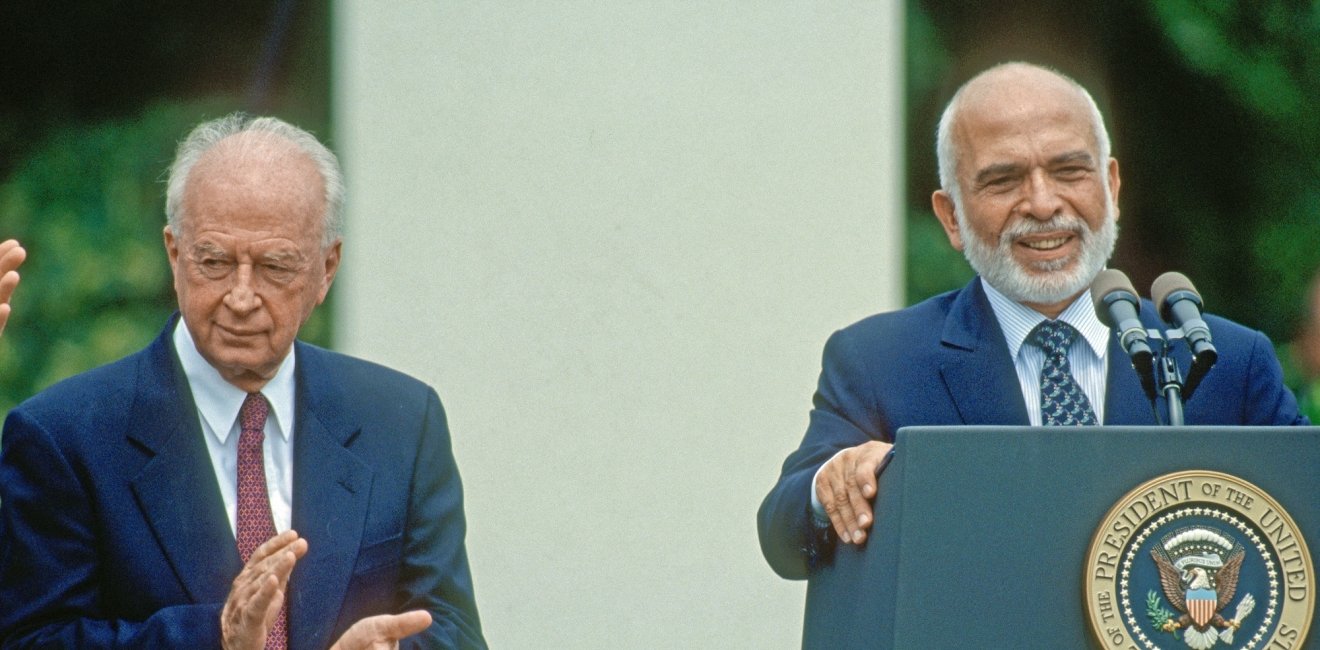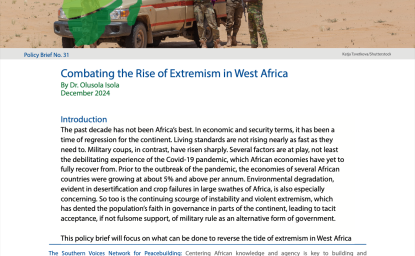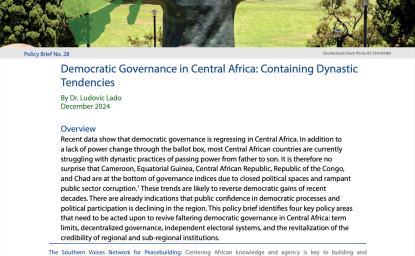Thirty Years Since Wadi Araba: There is a Treaty But No Warm Peace
MEP Director Merissa Khurma analyzes where the Israel-Jordan peace treaty, Wadi Araba, stands thirty years after its signing and the relationship between the two states today.
MEP Director Merissa Khurma analyzes where the Israel-Jordan peace treaty, Wadi Araba, stands thirty years after its signing and the relationship between the two states today.

I remember so distinctly when Air Force One landed in Amman, Jordan, in 1994. President Bill Clinton and then First Lady Hillary Clinton were greeted by the late King Hussein. The next day, the U.S. president would witness the signing of a historic agreement between Jordan and Israel, ending the state of war between the two countries that had existed since 1948. The agreement was signed in Wadi Araba, at one of the southern border crossings between the two countries.
I was watching the ceremony live with my parents. Many people wondered why King Hussein was not the one signing the treaty at the time, and I remember one of the TV commentators reiterating that it was the Prime Minister of Jordan, Abdel Salam Majali, who would sign as the head of the government that represented the people of Jordan. King Hussein often spoke of how this leap of faith for Jordan was not only a strategic deal but rather one that restores a life “free from fear…a life of peace for ‘the children of Abraham’” As Bruce Riedel, author of Jordan and America: An Enduring Friendship, notes, King Hussein wanted a “warm peace, not the cold peace between Egypt and Israel.”
Today, this agreement marks thirty years since the signing, and while it still stands, it is gelid.
Today, this agreement marks thirty years since the signing, and while it still stands, it is gelid. The long-anticipated people-to-people understanding and coming together that the late monarch hoped for has certainly lost its way over the last three decades for the simple fact that this bilateral peace treaty is intrinsically linked to the Palestinian-Israeli conflict and especially to Palestinian self-determination and rights.
The vast majority of Jordanians today view relations with Israel through the prism of its occupation of the Palestinian Territories, its oppression of Palestinians in the West Bank, and, in the last thirteen months, the immense suffering of innocents in Gaza due to Israel’s intense war. “I think King Hussein saw the peace treaty as something perhaps only he could achieve and then leave as part of his legacy to his successor. But part of the point was to take that enormous problem off the table for King Abdullah II and future generations,” noted Professor Curtis Ryan of Appalachian State University, adding, “I don’t think King Hussein could have imagined the desperate plight of the Palestinian people 30 years later. He seemed to assume that Israeli-Jordanian peace would set the stage for an Israeli-Palestinian peace to follow.”
The treaty had certainly weathered many storms over the last three decades and remains intact even amid the brutal war Israel is waging in Gaza, which to date has killed more than 43,000 Palestinians, of which women and children are more than half.
If there is one thing Jordanians of all backgrounds are calling for in unison at the various rallies, protests, and demonstrations held since the war started, it is to annul this treaty once and for all.
However, if there is one thing Jordanians of all backgrounds are calling for in unison at the various rallies, protests, and demonstrations held since the war started, it is to annul this treaty once and for all. Marwan Muasher, former Foreign Minister of Jordan and the country’s first Ambassador to Israel, noted that with the “war Israel is conducting in Gaza, killing tens of thousands of civilians, with the ethnic cleansing settlers are conducting in the West Bank with IDF support, and with Netanyahu declaring that the two-state solution is a ‘reward for terrorism,’ many Jordanians at the official and public levels are questioning what is left of the treaty that justifies why it was signed.” He contends that Jordan’s “principal” goal in signing the treaty in 1994 was to “facilitate the establishment of a Palestinian state on Palestinian soil” and also to “bury” the argument widely held by the Israeli far-right (now part of Netanyahu’s government), that ‘Jordan is Palestine,’ which in turn represents an existential and thus national security threat to Jordan.
This argument has resurfaced in recent years, not by a fringe group of politicians, but rather by ministers in the Israeli cabinet. Months before October 2023, Israeli Minister of Finance Bezalel Smotrich gave a speech in France, where he showcased a map that included Jordan and the occupied West Bank as part of Israel and said the Palestinian people were “an invention.” These remarks raised tensions between Israel and Jordan, but Israel did not issue an apology nor a statement condemning what Smotrich said, adding to the already tense relations between the Jordanian government and Bibi’s government, the most extremist in the country’s history. In some of my conversations with Jordanian activists who believe the peace treaty should be annulled, the specter of Jordan becoming part of Greater Israel or the “alternative homeland” of the Palestinians is very real.
Even as the wars Israel is waging in Gaza and the past month in Lebanon continue, Jordan’s official stance has been steadfast and clear.
However, even as the wars Israel is waging in Gaza and the past month in Lebanon continue, Jordan’s official stance has been steadfast and clear. Jordan remains committed to the treaty as it presses on with its commitment to the two-state solution to end the Palestinian-Israeli conflict—as untenable as this may seem today, given changing realities on the ground with expanded settlements in the West Bank, as well as the lack of support for this path in Israeli politics and society and, to a lesser extent, amongst Palestinians in the West Bank and Gaza. Jordanian Foreign Minister Ayman Safadi, a relentless voice against Israel’s conduct in Gaza, the West Bank, and Lebanon, told Al Mamlaka TV in April 2024 that the Jordan-Israel treaty “actualized all our rights and served our interests,” adding that “revoking it would not be in Jordan’s or the Palestinians’ interest…in actual fact, this would harm both Jordan and Palestine and greatly limit our ability to continue fulfilling our main and primary role in providing aid to the Palestinian people,” in response to calls to annul it. This has been a consistent message reiterated by Jordanian officials across the board, especially in the last thirteen months.
It perhaps explains why, in one of the latest polls taken by NAMA, a Jordanian strategic consulting firm, in May 2024, almost 42% of Jordanians are “for keeping the peace treaty.” One would expect this number to be much lower given the deterioration of humanitarian conditions in Gaza and the intensity of Israeli strikes and Palestinian civilian causalities. According to this poll, 55% of Jordanians are for annulling the treaty. Mo Dalhoum, the pollster working on these surveys, believes this thinking is impacted by the “Jordanian government’s messaging” on why the peace treaty is critical for Jordan’s security but also its key role in providing humanitarian aid to the Palestinians.
Another factor, Dalhoum noted, is people’s fear of the war spilling over to Jordan, which shapes their understanding of the criticality of the treaty for Jordan’s territorial integrity and national security. After all, even though political relations between the leaders in Jordan and Israel remain sour, the security cooperation between the two sides remains solid despite being tested recently by two violent attempts in the last two months.
One thing is for sure: there was no commemoration of this day, October 26, 1994, marking three decades. For many in Jordan, the durability of the treaty and the work that goes behind that—especially on the security front—is taken for granted by Israel, which does not seem to understand the enormous pressures Jordan is under. As Ryan notes, at this point, “From the Jordanian side, it doesn’t feel like the treaty is a great and durable achievement but more like an expedient measure that has its uses, and it simply persists because the alternatives might be worse.”
The views represented in this piece are those of the authors and do not express the official position of the Wilson Center.


The Wilson Center’s Middle East Program serves as a crucial resource for the policymaking community and beyond, providing analyses and research that helps inform US foreign policymaking, stimulates public debate, and expands knowledge about issues in the wider Middle East and North Africa (MENA) region. Read more


